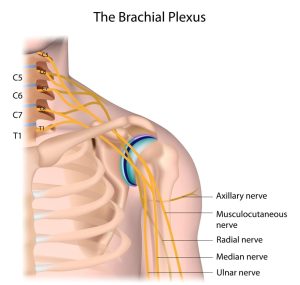Long Term Disability Lawyers for Brachial Plexus Injuries
If you sustained a brachial plexus injury and can’t return to your job, do not hesitate to contact Capitan Law. You might be entitled to long term disability benefits to replace part of your lost wages.
The brachial plexus is a network of nerves responsible for transmitting signals from the spinal cord to the arm, hand, and shoulder. A brachial plexus injury is painful and can interfere with normal movement or range of motion. It occurs when the nerves compress, stretch, or rip apart from the spinal cord.
Severe damage to the brachial plexus can cause long-term issues. Many people can’t maintain employment while treating the injury. Long term disability benefits might be necessary to make up for lost income so the injured person can pay for medical treatment and daily living expenses.
At Capitan Law, our upper extremity impairment long term disability lawyers know how to handle long term disability claims. We can file an initial claim on your behalf or appeal a denied claim. Call us at (267) 419-7888 today for your free consultation to learn more about how we can help.
What Is a Brachial Plexus Injury?
 The brachial plexus nerves extend from the cervical spine to the upper sections of the torso. They form a network of nerves controlling motion in the arms, hands, and wrists. The nerves allow a person to throw an object, type on a keyboard, or raise their arms.
The brachial plexus nerves extend from the cervical spine to the upper sections of the torso. They form a network of nerves controlling motion in the arms, hands, and wrists. The nerves allow a person to throw an object, type on a keyboard, or raise their arms.
Brachial plexus nerves also extend to the skin allowing someone to feel sensations, such as heat from a stove.
Brachial plexus injuries occur under various circumstances. They can happen when the body suffers trauma during a car crash or from overextending the nerves while reaching for something on a high shelf.
This disabling condition cuts off some or all communication between the spinal cord and shoulder, arm, hand, and wrist. A loss of sensation and reduced range of motion or movement is likely when the nerves tear away from the spinal cord or become compressed or stretched.
Common Symptoms of a Brachial Plexus Injury
The signs and symptoms of a brachial plexus injury depend on the location and severity of the damage. A minor injury compresses or stretches the nerves and can lead to symptoms such as:
- Weakness and numbness in the arm
- Burning sensation shooting down the arm or a feeling like an electrical shock
 Typically, these symptoms last several seconds or minutes. However, the injury might cause symptoms to linger for multiple days or longer.
Typically, these symptoms last several seconds or minutes. However, the injury might cause symptoms to linger for multiple days or longer.
A severe brachial plexus injury occurs when the nerve ruptures or tears away from the spinal cord. Common symptoms include:
- Severe pain
- Complete loss of feeling and lack of movement in the arm, hand, or shoulder
- Weakness or the inability to use specific muscles in the arm, shoulder, or hand
Long Term Disability Benefits for a Brachial Plexus Injury
Long term disability (LTD) insurance offers financial assistance to employees who can’t work for long periods due to a qualifying medical condition. Employees can collect payments to replace part of their wages until they can return to their jobs.
Every LTD policy differs, but most provide between 50% and 80% of a covered individual’s monthly wage before they were injured or became ill. You must go through an elimination period before receiving benefits. Typical elimination periods are 30 to 180 days. You will receive your first payment once the elimination period ends.
Payments continue for two years or longer, depending on the policy and whether your brachial plexus injury prevents you from returning to work. Some policies allow workers to collect LTD benefits until they turn 65. Under certain circumstances, you might receive lifetime benefits if you can’t do any job due to your injury.
Common Reasons for LTD Claim Denials
A denied long term disability claim can result from various factors. Sometimes, insurance companies act in bad faith by failing to properly investigate or deny a claim without providing a valid reason.
A denied LTD claim might occur when a claimant makes an error during the claims process. The most common mistakes include:
- Definition of disability – Your brachial plexus injury must meet the definition of disability on your policy. The insurer can deny your claim if they don’t cover your type of injury.
- Missing or inaccurate information – You must include all necessary information while filing a claim for LTD benefits. The insurance company can deny your claim if you don’t provide complete forms or include inaccurate information.
- Missed deadline – You must adhere to strict deadlines while applying for LTD benefits. If you miss a filing deadline or don’t respond to the insurance company’s request for additional information, they can deny the claim.
- Failure to attend an IME appointment – Some insurers require claimants to attend an independent medical exam (IME). The IME allows a doctor to examine you to determine whether they agree with your physician’s initial diagnosis. The insurance company can issue an automatic denial if you skip the appointment.
Steps to Appeal a Denied LTD Claim
The Employee Retirement Income Security Act (ERISA) is a federal law that establishes standards for health and retirement plans. You must follow specific steps required by ERISA if you want to appeal a denied claim.
You must file an administrative appeal within the timeframe on the denial letter. The insurance company will review your appeal to determine if it will reverse the initial decision, and you can submit evidence to prove you are entitled to benefits.
Common evidence includes:
- Statements from vocational and medical experts
- Additional documentation from medical providers
- Letters from family and friends indicating the impact of the injury on your daily life
- Statements from employers explaining how the injury prevents you from working
Contact an Experienced Long Term Disability Lawyer for Brachial Plexus Injuries Today
 Capitan Law advocates for the rights of injured clients. Our team understands the financial strain of being out of work due to a debilitating injury.
Capitan Law advocates for the rights of injured clients. Our team understands the financial strain of being out of work due to a debilitating injury.
Brachial plexus injuries can impair physical functioning and prevent someone from performing job-related tasks. You might be unable to afford your medical bills and other expenses if you don’t earn your regular income.
If you can’t work due to a brachial plexus injury, call the long term disability lawyers of Capitan Law at (267) 419-7888 for your free consultation. We can help you with your LTD claim or appeal.
Related Posts: